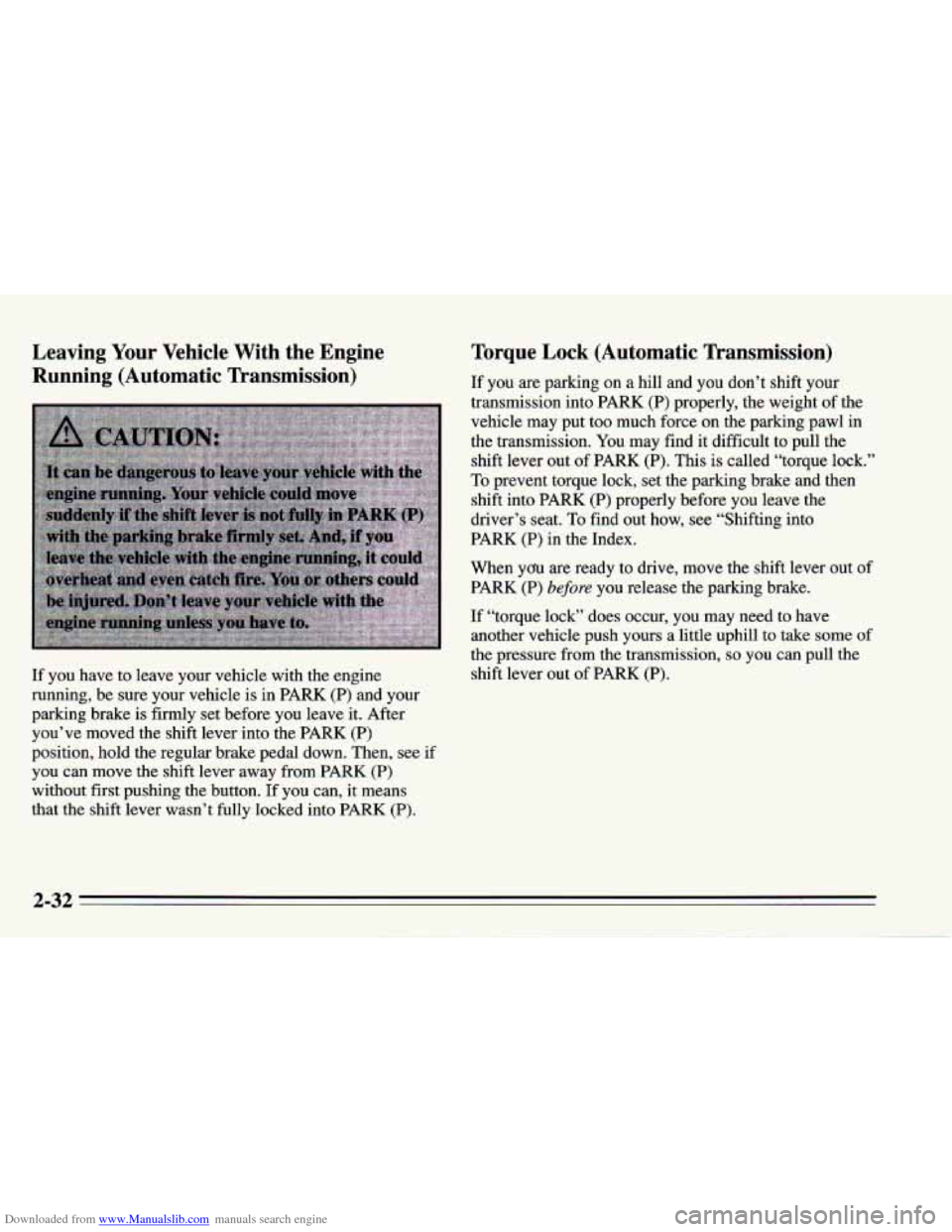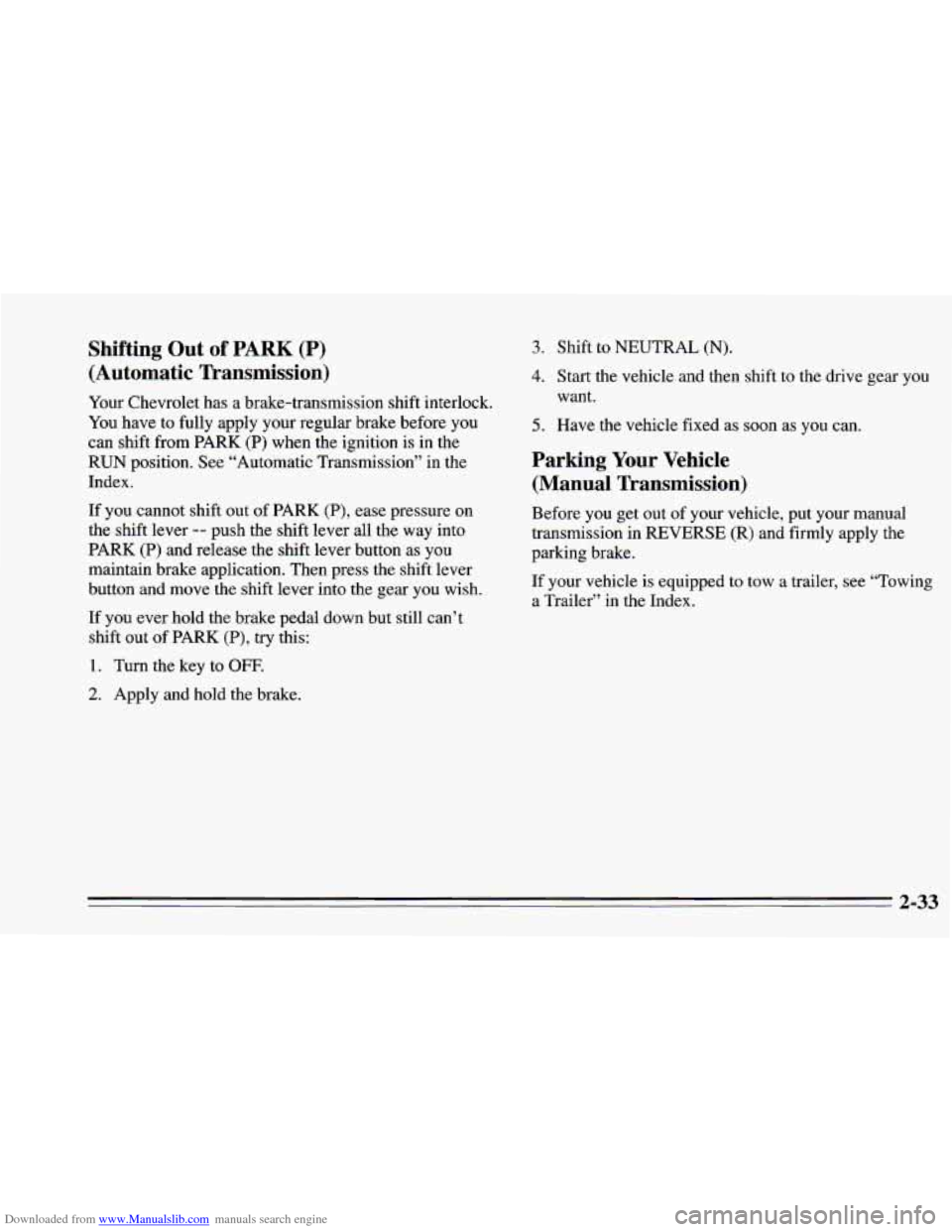Page 83 of 388
Downloaded from www.Manualslib.com manuals search engine Shifting Into PARK (P)
(Automatic Transmission Models only)
1. Hold the brake pedal down with your right foot and
set the parking brake.
2. Move the shift lever into PARK (P) position by
holding in the button on the lever, and push the lever
all the way toward the front
of your vehicle.
3. Move the ignition key to LOCK.
4. Remove the key and take it with you. If you can
walk away
from your vehicle with the ignition key in
your hand, your vehicle is in PARK (P).
2-31
Page 84 of 388

Downloaded from www.Manualslib.com manuals search engine Leaving Your Vehicle With the Engine
Running (Automatic Tkansmission)
If you have to leave your vehicle with the engine
running, be sure your vehicle
is in PARK (P) and your
parking brake
is firmly set before you leave it. After
you’ve moved the shift lever into the PARK (P)
position, hold the regular brake pedal down. Then, see if
you can move the shift lever away from PARK
(P)
without first pushing the button. If you can, it means
that the shift lever wasn’t fully locked into PARK
(P).
Torque Lock (Automatic Transmission)
If you are parking on a hill and you don’t shift your
transmission into PARK
(P) properly, the weight of the
vehicle may put too much force on the parking pawl in
the transmission. You may find it difficult to pull the
shift lever out of PARK (P). This
is called “torque lock.”
To prevent torque lock, set the parking brake and then
shift into PARK
(P) properly before you leave the
driver’s seat.
To find out how, see “Shifting into
PARK (P) in the Index.
When
ydu are ready to drive, move the shift lever out of
PARK
(P) before you release the parking brake.
If “torque lock” does occur, you may need to have
another vehicle push yours a little uphill to take some
of
the pressure from the transmission, so you can pull the
shift lever out
of PARK (P).
2-32
Page 85 of 388

Downloaded from www.Manualslib.com manuals search engine Shifting Out of PARK (P)
(Automatic Transmission)
Your Chevrolet has a brake-transmission shift interlock.
You have to fully apply your regular brake before
you
can shift from PARK (P) when the ignition is in the
RUN position.
See “Automatic Transmission” in the
Index.
If you
canil6t shift out of PARK (P), ease pressure on
the shift lever
-- push the shift lever all the way into
PARK (P) and release the shift lever button as you
maintain brake application. Then press the shift lever
button and move the shift lever into the gear you wish.
If you ever hold the brake pedal down but still can’t
shift out of PARK
(P), try this:
1. Turn the key to OFF.
2. Apply and hold the brake.
3. Shift to NEUTRAL (N).
4. Start the vehicle and then shift to the drive gear YOU
want.
5. Have the vehicle fixed as soon as you can.
Parking Your Vehicle
(Manual Transmission)
Before you get out of your vehicle, put your manual
transmission in REVERSE (R) and firmly apply the
parking brake.
If your vehicle is equipped to tow a trailer, see “Towing
a Trailer” in the Index.
2-33
Page 87 of 388
Downloaded from www.Manualslib.com manuals search engine Running Your Engine While You’re
Parked (Automatic Transmission)
It’s better not to park with the engine running. But if you
ever have to, here are
some things to know.
Follow the proper steps to be sure your vehicle won’t
move, See “Shifting Into PARK (P)” in the Index.
If
you are parking on a hill and if you’re pulling a
trailer,
also see “Towing a Trailer” in the Index.
2-35
Page 94 of 388
Downloaded from www.Manualslib.com manuals search engine Cruise Control (Option)
With cruise control, you can maintain a speed of about
25 mph (40 km/h) or more without keeping your foot on
the accelerator. This can really help on long trips. Cruise
control does not work at speeds below about
25 mph
(40 km/h).
When you apply your brakes, or push the clutch pedal, if
you have a manual transmission, the cruise control shuts
Off.
If your vehicle is in cruise control when the optional
ASR System begins to limit wheel spin, the cruise
control will automatically disengage. (See
“ASR
System’’ in the Index). When road conditions allow you
to safely use it again,
you may turn the cruise back on.
3 A3
Page 114 of 388
Downloaded from www.Manualslib.com manuals search engine Sun Visors
To block out glare, you can swing down the visors. You
can also swing them
to the side. The elastic bands on
your visor provide extra storage for maps or papers.
Covered Visor Vanity Mirror
Pull down the sun visor and lift the cover to expose the
vanity mirror.
Ashtray and Lighter
Front Ashtray
Lift up the cover to open the ashtray. To remove it, lift
up
on the right side of the ashtray. If you have an
automatic transmission, the ashtray is near the front
of
your console. If you have a manual transmission, the
ashtray is near your cupholder.
2-62
Page 117 of 388
Downloaded from www.Manualslib.com manuals search engine 1. Upper Air Vent
2. Main Light Control
3. Side Upper Air Vent
4. Instrument Cluster
5. Comfort Controls
6. Audio System
7. Side Window Defogger Vent
8. Glove
Box
9. Remote Hatch Release
10. Cassette Tape Storage
11. Shift Lever
12. Parking Brake Lever 13.
Cupholder
14. Storage Console and Compact Disc Storage (if
equipped)
15. Acceleration Slip Regulation Switch (if equipped)
16. Ashtray (Automatic Transmission)
17. Cigarette Lighter
18.
Horn
19. Rear Window Defogger Switch
20. Fog Lamp Switch (if equipped)
2 1. Convertible Top Switch (if equipped)
22. Ashtray (Manual Transmission)
2-65
Page 132 of 388
Downloaded from www.Manualslib.com manuals search engine Convertible Top
The following procedures explain the proper operation
of
your convertible top.
To Lower Your Convertible Top
NOTICE:
Don't leave your convertible out with the top
down for any long periods of time. The sun and
the rain can damage your seat material and other
things inside your vehicle,
1. Park on a level surface. Set the parking brake firmly.
Shift an automatic transmission into
PARK (P) or a
manual transmission into REVERSE (R). The
ignition must be in the
ACC or RUN position. Lower
both sun visors.
NOTICE:
Don't lower the top if it is damp or wet, When
the top is down, trapped water can cause stains,
mildew and damage to the inside of your vehicle.
Be sure to dry
off the top before you lower it.
I NOTICE:
It is not recommended to lower the top if the
vehicle
is out in cold weather, 0" F (-18" C) or
lower.
2-80
I